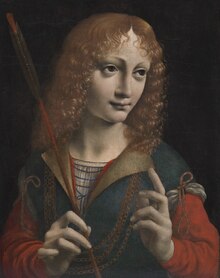Gian Galeazzo Sforza
| Gian Galeazzo Sforza | |
|---|---|
 Gian Galeazzo Sforza, c.1483, by Giovanni Ambrogio de Predis | |
| Duke of Milan | |
| Reign | 26 December 1476 – 21 October 1494 |
| Predecessor | Galeazzo Maria Sforza |
| Successor | Ludovico Sforza |
| Born | 20 June 1469 Abbiategrasso |
| Died | 21 October 1494 (aged 25) Pavia |
| Spouse | |
| Issue | Francesco Sforza Ippolita Maria Sforza Bona, Queen of Poland Bianca Maria Sforza |
| House | Sforza |
| Father | Galeazzo Maria Sforza |
| Mother | Bona of Savoy |
Gian Galeazzo Sforza (20 June 1469 – 21 October 1494), also known as Giovan Galeazzo Sforza, was the sixth Duke of Milan.
Early life
[edit]Born in Abbiategrasso, Gian Galeazzo was son of Galeazzo Maria Sforza and Bona of Savoy.[1] He was only seven years old when in 1476 his father, Galeazzo Maria, was assassinated and he became the Duke of Milan. His uncle, Ludovico Sforza, acted as regent to the young duke, but quickly wrested all power from him and became the de facto ruler of Milan. Ludovico imprisoned Gian Galeazzo and later became the duke after Gian Galeazzo's death, which was widely viewed as suspicious.[2]
Marriage and issue
[edit]In February 1489, Gian Galeazzo married his cousin Princess Isabella of Naples.[3] Together they had:
- Francesco Sforza (1491–1512)
- Ippolita Maria Sforza (1493–1501)
- Bona Sforza (1494–1557); married Sigismund I of Poland
- Bianca Maria Sforza (posthumously 1495–1496)
Death
[edit]
In 1491 Ludovico Sforza had Gian Galeazzo Sforza and his wife Isabella of Aragon transferred to the Visconti Castle of Pavia where they created a brilliant court.[4] Gian Galeazzo died in 1494 in the Visconti Castle, the summer home of the Visconti and Sforza families. During that time, he received a visit from Charles VIII of France. According to the Italian historian Francesco Guicciardini in his History of Italy (Italian: La Historia di Italia), he was poisoned by his uncle, Ludovico il Moro.[5]
The rumor was widespread that Giovan Galeazzo's death had been provoked by immoderate coitus; nevertheless, it was widely believed throughout Italy that he had died not through natural illness nor as a result of incontinence, but had been poisoned … one of the royal physicians … asserted that he had seen manifest signs of it. Nor was there anyone who doubted that if it had been poison, it had been administered through his uncle Ludovico Sforza's machinations …
Ancestry
[edit]| Ancestors of Gian Galeazzo Sforza | ||||||||||||||||||||||||||||||||||||||||||||||||||||||||||||||||||||||||||||||||||||||||||||||||||||||||||||||||||||||||||||||||||||||||||||||||||||||||||||||||||||||||||||||||||||||||||||||||||||||||||||||||||||||||||||||||||||||||||||||||||||||||||||||||||||||||||||||||||||||||||||||||||||||||||||||||||||||||||||||||||||||||||||||||||||||||||||||||||||||||||||||||||||||||||||||||||||||||||||||||||||||||||||||||||||||||||||||||||||||||||||||||||||||||||||||||||||||||||||||||||||||||||||||||||||||||||||||||||||||||||||||||||||||||||||||||||||||||||||||||||||||||||||||||||||||||||||||||
|---|---|---|---|---|---|---|---|---|---|---|---|---|---|---|---|---|---|---|---|---|---|---|---|---|---|---|---|---|---|---|---|---|---|---|---|---|---|---|---|---|---|---|---|---|---|---|---|---|---|---|---|---|---|---|---|---|---|---|---|---|---|---|---|---|---|---|---|---|---|---|---|---|---|---|---|---|---|---|---|---|---|---|---|---|---|---|---|---|---|---|---|---|---|---|---|---|---|---|---|---|---|---|---|---|---|---|---|---|---|---|---|---|---|---|---|---|---|---|---|---|---|---|---|---|---|---|---|---|---|---|---|---|---|---|---|---|---|---|---|---|---|---|---|---|---|---|---|---|---|---|---|---|---|---|---|---|---|---|---|---|---|---|---|---|---|---|---|---|---|---|---|---|---|---|---|---|---|---|---|---|---|---|---|---|---|---|---|---|---|---|---|---|---|---|---|---|---|---|---|---|---|---|---|---|---|---|---|---|---|---|---|---|---|---|---|---|---|---|---|---|---|---|---|---|---|---|---|---|---|---|---|---|---|---|---|---|---|---|---|---|---|---|---|---|---|---|---|---|---|---|---|---|---|---|---|---|---|---|---|---|---|---|---|---|---|---|---|---|---|---|---|---|---|---|---|---|---|---|---|---|---|---|---|---|---|---|---|---|---|---|---|---|---|---|---|---|---|---|---|---|---|---|---|---|---|---|---|---|---|---|---|---|---|---|---|---|---|---|---|---|---|---|---|---|---|---|---|---|---|---|---|---|---|---|---|---|---|---|---|---|---|---|---|---|---|---|---|---|---|---|---|---|---|---|---|---|---|---|---|---|---|---|---|---|---|---|---|---|---|---|---|---|---|---|---|---|---|---|---|---|---|---|---|---|---|---|---|---|---|---|---|---|---|---|---|---|---|---|---|---|---|---|---|---|---|---|---|---|---|---|---|---|---|---|---|---|---|---|---|---|---|---|---|---|---|---|---|---|---|---|---|---|---|---|---|---|---|---|---|---|---|---|---|---|---|---|---|---|---|---|---|---|---|---|---|---|---|---|---|---|---|---|---|---|---|---|---|---|---|---|---|---|---|---|---|---|---|---|---|---|---|---|---|---|---|---|---|---|---|---|---|---|---|---|---|---|---|---|---|---|---|---|---|---|---|---|---|---|---|---|---|---|---|---|---|---|---|---|---|---|---|---|---|---|---|---|---|---|---|---|---|---|---|---|---|---|---|---|---|---|---|---|---|---|---|---|---|---|---|---|---|---|---|---|---|---|---|---|---|---|---|---|---|---|---|---|---|---|---|---|---|---|---|---|---|---|---|---|---|---|---|---|---|---|---|---|---|---|---|---|---|---|
| ||||||||||||||||||||||||||||||||||||||||||||||||||||||||||||||||||||||||||||||||||||||||||||||||||||||||||||||||||||||||||||||||||||||||||||||||||||||||||||||||||||||||||||||||||||||||||||||||||||||||||||||||||||||||||||||||||||||||||||||||||||||||||||||||||||||||||||||||||||||||||||||||||||||||||||||||||||||||||||||||||||||||||||||||||||||||||||||||||||||||||||||||||||||||||||||||||||||||||||||||||||||||||||||||||||||||||||||||||||||||||||||||||||||||||||||||||||||||||||||||||||||||||||||||||||||||||||||||||||||||||||||||||||||||||||||||||||||||||||||||||||||||||||||||||||||||||||||||
References
[edit]- ^ Hand 2013, Appendix 4.
- ^ Burckhardt 1878, p. 23.
- ^ Palos 2016, p. 181.
- ^ "Gian Galeazzo Maria Sforza". Treccani Dizionario Biografico degli Italiani. Retrieved 3 September 2022.
- ^ "Charles VIII visiting the deathbed of Gian Galazzo Sforza at". Europeana Collections. Retrieved 27 April 2019.
Sources
[edit]- Burckhardt, Jacob (1878). The Civilization of the Renaissance in Italy. University of Toronto – Robarts Library: Vienna Phaidon Press. p. 23. Retrieved 28 February 2019.
- Hand, Joni M. (2013). Women, Manuscripts and Identity in Northern Europe, 1350-1550. Routledge.
- Palos, Joan-Lluis (2016). "Eleonora Alvarez de Toledo (1522-62)". In Palos, Joan-Lluis; Sanchez, Magdalena S. (eds.). Early Modern Dynastic Marriages and Cultural Transfer. Routledge. pp. 165–188.
